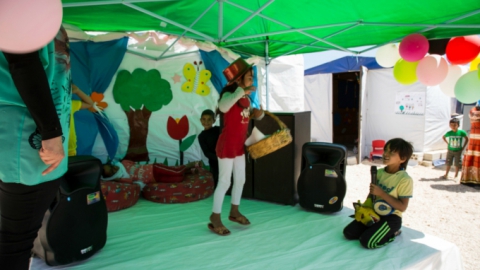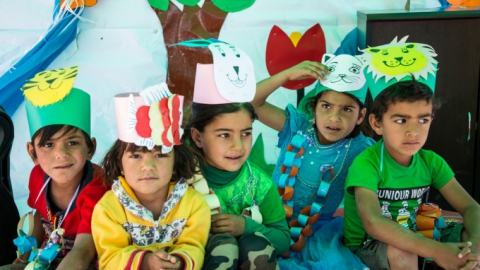Nurturing future talents

The stage is all set. The actors have rehearsed their roles and put on their theatrical outfit. The audience have taken their seats. They are ready for the moment. Ready for this ‘mini-adaptation.’
Hala* is sporting a green hat and carrying a splint oak basket. Faten* has draped a shawl around her head and put on horn-rimmed glasses that befit her grandmotherly looks.
The set-up has been arranged to resemble the woods. The whole picture now gives the unmistakable impression of what is to come. ‘Layla and the Wolf’, the Arabic version of the famous fairy tale ‘Little Red Riding Hood,’ is about to be played out by children and watched by their own parents.

Hala, six, and Faten, seven, are two talented girls who survived the war in Syria to meet for the first time at an informal refugee settlement in Lebanon’s Bekaa Valley. It was at Save the Children’s makeshift classroom where they realised they made a good team. They now take the stage.
‘’I was [playing] Layla (Little Red Riding Hood) and she was my grandmother’’ Hala explains after impressive performance, pointing at Faten.
‘’I was walking through the woods when Saad* (Big Bad Wolf) approached me. I learned that I should listen to my Mom’s advice to stay safe.’’
Safety is one of the many life topics that Hala learns about at this centre. Save the Children’s Early Childhood Care and Development programme aims to educate children and boost their cognitive knowledge in a child-friendly environment.
‘’We learn the letters and the names of the animals,’’ Hala says. ‘’We also practice drawing and many other things.
‘’I like the teacher. She teaches us new English words.’’
With no signs of hesitation or confusion, Layla puts the things she learned into practice. She starts counting the English letters. She pauses for a moment as she tries to remember what comes after the ‘S’. She instantly recovers. ‘T’ comes next. She keeps going. All 26 counted in the right order. No mistakes.
Hala and Faten speak about their daily classroom routine: Morning greetings, followed by noting the date on the white board and describing the weather outside.
The duo then break into their favourite morning song that they know by heart. It is about the seven days of the week and the beauty of friendship. Another essential lesson they learn here.

Save the Children’s Education project, funded by the US Bureau of Population, Refugees, and Migration in (BPRM) and implemented by the Education team in the Bekaa Valley, prepares children for school years. Many of those children have already missed out on education and hope to catch up with lost years.
Hala’s mother Fadwa* feels relieved to see her three children get a chance to learn despite the difficult situation that her family is going through. She says it has become a dream for Syrian parents to send their kids to school each morning and welcome them back in the afternoon.
‘’My children love to come here [to Save the Children’s classroom] each morning to learn and play. They like drawing and painting. They did not have a chance to go school so this [programme] has made it possible for them to know the letters and numbers.
One particular observation tells Fadwa that the children’s appetite for education has grown enormously.
‘’I have noticed that they now wake up early because they know it is school time.’’
* Names have been changed for protection purposes.
 Lebanon
Lebanon